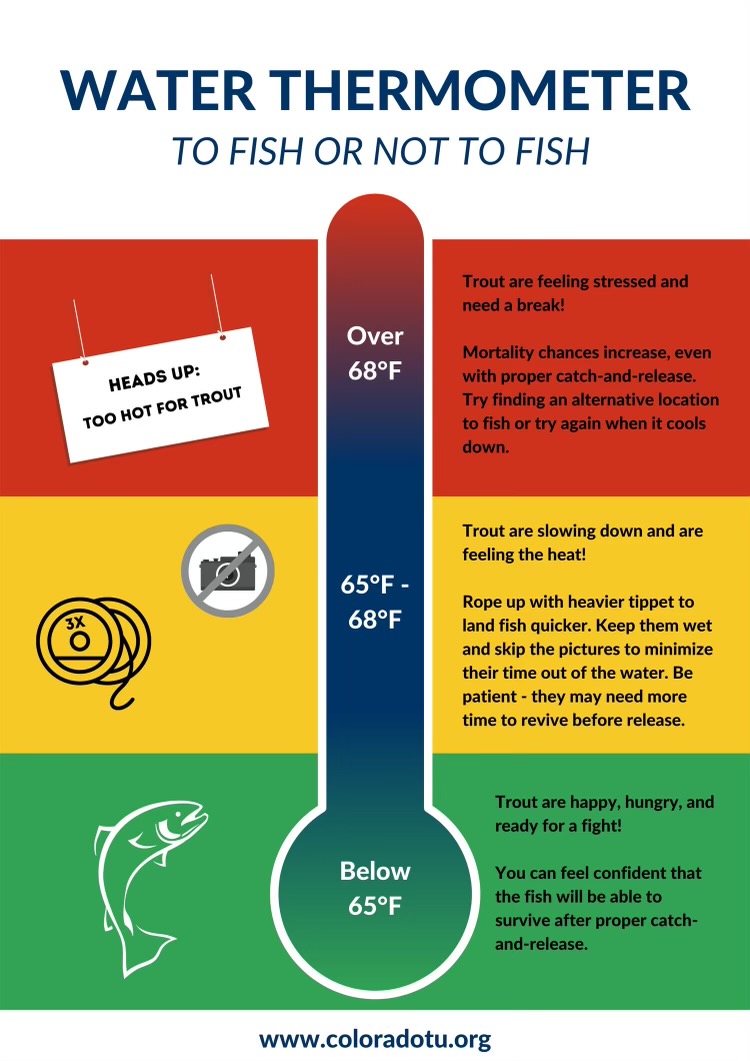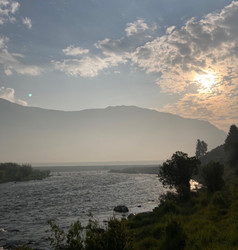Dog Days and Haze: How to Fish Responsibly During a Drought
Posted by Nick Teynor on Jul 31st 2021
Unless you've been living under a rock for the past several months, we should all be aware that the whole Western U.S. is in the middle of a terrible drought. Escaping to the water to cool off and find a couple of fish is a great way to get some much needed reprieve from the heat, but we anglers need to be aware of what the heat means for our fish and fisheries. Conservation organizations and biologists have been telling us that any water temperature over 67 degrees is not conducive for trout. Once water temps reach this pivotal tipping point, trout are not able to filter as much oxygen out of the water. Not being able to get as much oxygen is incredibly stressful on trout, and forces them to slow down (i.e. become lethargic) to conserve energy. A good example of how fish struggle with getting oxygen during warm water temps, is to imagine trying to hike Mount Olympus, on a hot day, while breathing out of a straw. Most folks would give up, or pass out, before they made it a hundred yards out of the parking lot! When anglers hook, fight, and land fish in water temps of 67 degrees or greater, the chances of stressing fish to the point of death increases dramatically.
In an effort to help educate and curb unnecessary fish deaths, I decided to write this post to talk about the steps we are taking to minimize our impact to the fish and fisheries. One of the simplest ways to make sure you minimize your impact is to carry a thermometer with you, and take water temperatures periodically while fishing. Instead of just guessing whether the water is ok, or too warm to fish, a thermometer will give you a more accurate measurement of what's going on, and whether or not you should keep fishing, or get off the water. Where, and when you choose to fish is also crucial to making sure we limit our impact on fish during these tough times.
Let's start with where to fish. During drought conditions it is the freestone rivers, creeks, and streams that are most negatively affected. Freestone fisheries are those that depend on snowmelt, rain, smaller tributaries, and outlets from lakes, to keep them flowing. All of these sources are negatively impacted by lack of water, which then wreak havoc on these fisheries. It is for these reasons that we at the shop stop fishing freestone streams during droughts, and instead focus our fishing on Tailwaters.
Tailwater fisheries are those that run out of dams that form reservoirs. As long as the reservoir is deep enough, these fisheries typically have cooler water temperatures than Freestone fisheries because the water being pulled through the dam is from the lower depths of the reservoir, which is nice and cold. The cooler water temperatures keep fish living in these fisheries much more comfortable, less stressed, and more capable of being able to recover after being caught. However, not all tailwater fisheries are the same. Those that have shallower reservoirs experience similar warm-water conditions during droughts as freestone fisheries, and should also be avoided during the hottest parts of the day.
Other fishing options to consider during a drought are heading to the high elevation lakes to chase trout, or to switch gears, and pursue warm-water species of fish such as bass, sunfish and carp. The cool water of mountain lakes is welcome refuge for both trout and angler alike, and offer(s) solitude and beautiful alpine views to the angler(s) willing to put the time in to hike away from the trailhead. Bass, sunfish, and carp will all take flies, and are not as negatively impacted by the warmer water caused by the "Dog Days". Being that these fish fall into the warm-water category, they typically survive, and even thrive in water temps that would kill trout. So, if you want to go after fish species that you can fish for, and not have to worry about stressing out, warm-water fisheries are something that no angler should overlook.
This brings us to when we look to go fish. In order to find the coolest, most comfortable water and air temperatures during the hottest parts of Summer, I'd recommend you focus your angling efforts in the mornings and evenings. These fringe parts of the day are when our summer bugs (PMDs, Caddis, etc.) will be most active, which then in turn will get the fish actively feeding on them, which leads to good-great fishing opportunities for us. Not only will the insects be more active, but the cooler and more comfortable water temperatures will also be super beneficial to the local trout, and allow them to recover with little no problem after being caught and released.
Variables that anglers should also be aware of, and take action to help minimize stressing fish, are things as simple as using as heavy of a leader/tippet as possible, use barbless hooks, and minimize your handling of fish by keeping your hands and the fish wet in a rubber bag net. Fishing with heavier leaders and tippets helps us land fish quicker, which increases the chances of them having plenty of energy to swim off and recover after being caught. Using barbless hooks also decreases the harm done to the mouth and gill areas of the fish, and expedites the release process. Using a rubber bag net allows fish to recover in a place that won't strip their protective slime off, while also helping reduce the amount of touching they receive from us. They can also regain equilibrium, and release themselves back into the stream when they are ready, thus also helping with survival rates.
Another simple solution to help make sure fish survive a drought, is to limit the amount of time you fish, and the amount fish you catch. Walking away from the water, especially when the fishing is good, is something that I still struggle to do. This year being the way it is, however, I have made it a point to walk-away; particularly after finding a good fish, or a great eat. I have found that doing so has made me appreciate my fishing experiences more, and in one way or another, help limit my impact on stressed resources. If all of us [anglers] do these simple, little things, I'm confident that our fish will make it through these tough times, and that as a result of these actions, the fisheries will be amazing once our water returns to "normal" flows. If you have any questions or concerns about how to fish responsibly during a drought, please feel free to reach out to us!




